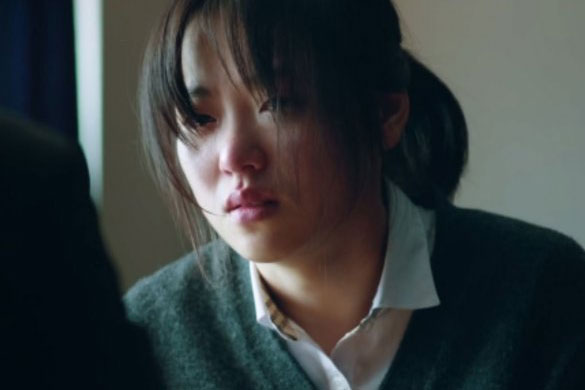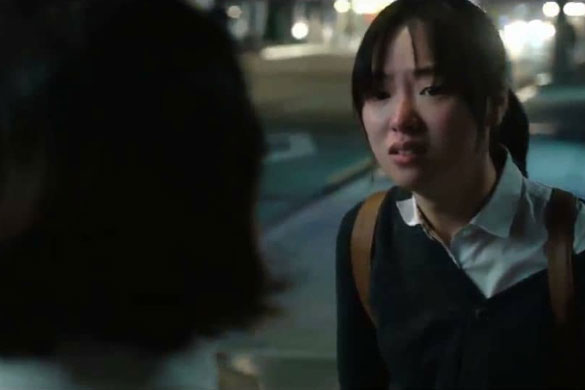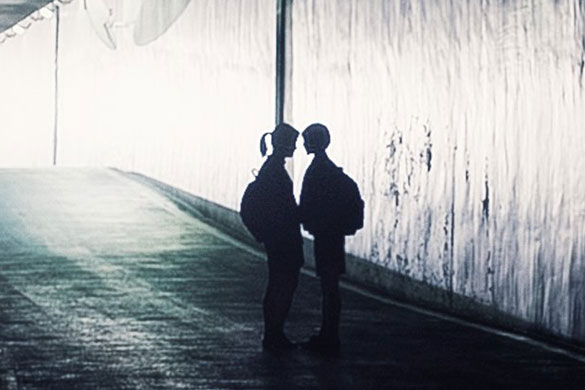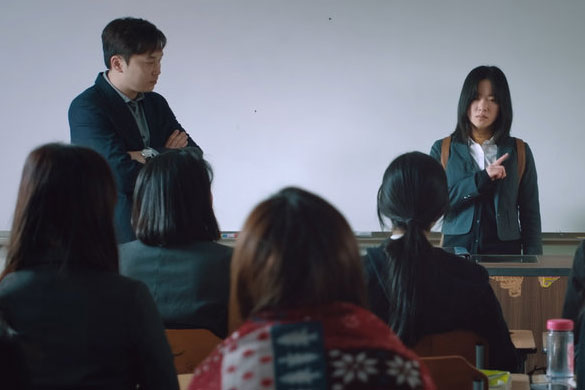"'I'm not scared of dying. Isn't it a relief that all this will one day be over?' That's what Kyung-min said.
So I told her my suicide plan. I'm jumping off that bridge too before I turn 20. I want to die too.
I thought that would comfort her..."
Synopsis:
Schoolgirl Kyung-min (Jeon So-nee) is missing. On discovering her backpack floating in the waters below a local bridge, police quickly assume she’s likely committed suicide and begin a search of the river’s murky depths for her body.
At the same time, detective Kim (Yoo Jae-myung) begins questioning Kyung-min’s classmates to timeline her movements in the lead-up to her disappearance but on talking to Young-hee (Jeon Yeo-bin) –formally a close friend of Kyung-min prior to an estrangement of the two – he discovers her version of events relating to the night of Kyung-min’s disappearance differs from that of her friend Han-sol (Go Won-hee); Han-sol claiming Young-hee asked Kyung-min to prove her feelings for her by killing herself.
With Kyung-min’s mother (Seo Young-hwa) increasingly convinced that Young-hee is responsible for whatever happened to her daughter, detective Kim realises that only by understanding the relationship between the two girls will he be able to uncover the extent and nature of Young-hee’s involvement and indeed prove her guilt or innocence...
Review:
After My Death's opening scene is set in Young-hee's class as she returns to school after a period of absence, the reason for which being initially unstated. Standing beside her at the front of the room, her teacher instructs her classmates to welcome back their "long-awaited friend" then gestures for Young-hee to take a seat but instead she makes a statement using sign language which is met with a gentle round of applause from the other kids.
I think it can be safely assumed that few, if any, of those applauding have any idea of what Young-hee is actually signing and that goes for viewers too as her silent words are deliberately not subtitled.
That assumption is validated at a much later stage when the scene is repeated (this time with subtitles) in its proper place within proceedings and finally knowing what she's saying – especially with narrative context in hindsight – you can pretty much guarantee that if the children did understand her it's unlikely they’d be clapping at all. For Young-hee’s statement doesn’t herald the start of her story as we are first led to believe (understanding it or not), rather it speaks of its conclusion and ultimately knowing what led to it brings a comprehension far deeper than simply recognising her words and adds a level of poignancy to it that is frankly palpable.
That is of course the scene's true purpose but its appearance at the very beginning of the film nonetheless deftly serves to draw us into Young-hee’s story and from the outset raise questions even before we realise we need to ask them, the answers to which being pivotal to an understanding of the young woman's mindset; her actions relating to Kyung-min as well as herself and indeed consequences in their wake.
 |
Over the years in Korean cinema there has been a plethora of films focused on characters of high school age, most in some shape or form using narratives to point to child related societal issues, not least as often as not critiquing the Korean education and school system, be it peer pressure; bullying; sexual identity; the pressure put on Korean teens to excel academically at all cost; or indeed all of the above. Debut feature director Kim Ui-seok references each and every one of these throughout After My Death but never cites any or all as a singular reason for Young-hee and indeed Kyung-min’s virtual abhorrence of life itself, rather implying that their wholly negative outlooks and mindsets come from a far more complex place.
Case in point: On seeing Young-hee being questioned early on in proceedings by first her teacher and shortly thereafter by detective Kim about Kyung-min’s disappearance, viewers could easily assume that her sullen demeanour and tacit negativity are a result fears of what’s befallen Kyung-min, but while the tears in her eyes do indeed point to that we soon discover they appear on a regular basis in various interactions all of which tend towards pain and sorrow.
Certainly, Young-hee has no love for life but as we watch the way that life treats and continues to treat her, forcing her hand in the actions she takes, I for one could not escape the realisation that a myriad of societal and personal issues have incrementally stripped away her will to live to the extent that she has developed what can only be described as a death wish.
 |
This is further underlined by Kyung-min’s story but, make no mistake, though the investigation into what has befallen her initially appears as After My Death’s raison d'être this is Young-hee’s story through and through, the few brief flashbacks speaking more of her relationship with Young-hee than of the missing girl’s individual character arc, important (obviously) though it is to the complete story. All of the above may sound bleak and melancholic in the extreme – and indeed After My Death is as stark as virtually any Korean film you could care to mention with an absolutely minimal musical score and pulling no punches whatsoever in its depictions of pain, angst and indeed violence – but Kim Ui-seok goes to great lengths in both his screenplay writing and directing to ensure this tale of two young women who have given up on both life and themselves is grippingly insightful throughout, helped yet further by a superlative performance from actress Jeon So-nee.
Not only that, but the success of both director and actress in eliciting viewer empathy for a character fuelled entirely by negativity is a sight to behold and ultimately one of After My Death’s many, many strengths.
After My Death is certainly not an easy watch by any means but it is a satisfying one, nuanced and accomplished to the extent that it at no point appears as a debut feature.
 |
Summary:
While After My Death is both bleak and melancholic from its very outset to its final frame it is grippingly so, its palpable emotional depth ensuring it at no point appears as the debut feature it actually is. A testament to the continuing superlative quality of independent Korean cinema.
AFTER MY DEATH (죄많은소녀 / 2017)
Director: Kim Ui-seok
Starring: Jeon Yeo-bin, Seo Young-hwa, Go Won-hee, Jeon So-nee
|





